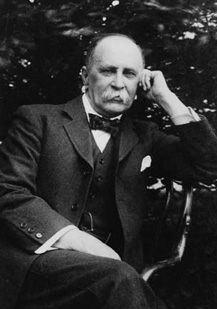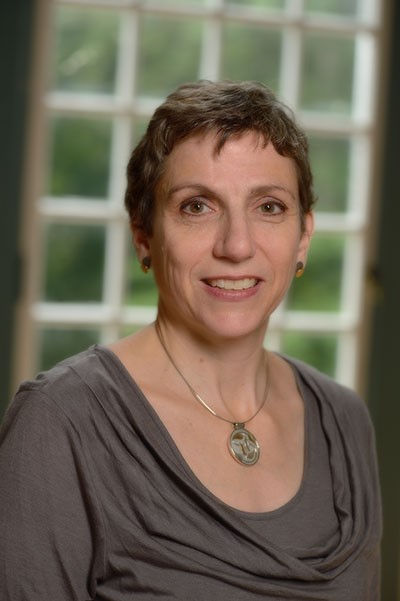 WILLIAM OSLER, one of Hopkins’ four founding doctors, served as physician-in-chief and professor of medicine. He was a proponent of the close integration of the hospital with the instruction of students in the School of Medicine–a model emphasizing teaching at the bedside that he pioneered at Johns Hopkins. Through lectures and his landmark textbook, first issued in 1892, Principles and Practice of Medicine, he had a tremendous influence on both clinical practice and medical education in America. During the 14 years he spent at Hopkins, Dr. Osler revolutionized the medical curriculum of the United States and Canada, ushering in the era of scientific medicine and creating policies and programs that have endured. Dr. Osler was a skilled diagnostician, a generalist who believed physicians should be knowledgeable in a broad range of specialties. He did seminal work in hematology. He also published amusing and inspiring essays and speeches, still popular among physicians. Perhaps his most lasting legacy was his vision of how a physician ought to be: skillful and competent, yet approachable and compassionate.
WILLIAM OSLER, one of Hopkins’ four founding doctors, served as physician-in-chief and professor of medicine. He was a proponent of the close integration of the hospital with the instruction of students in the School of Medicine–a model emphasizing teaching at the bedside that he pioneered at Johns Hopkins. Through lectures and his landmark textbook, first issued in 1892, Principles and Practice of Medicine, he had a tremendous influence on both clinical practice and medical education in America. During the 14 years he spent at Hopkins, Dr. Osler revolutionized the medical curriculum of the United States and Canada, ushering in the era of scientific medicine and creating policies and programs that have endured. Dr. Osler was a skilled diagnostician, a generalist who believed physicians should be knowledgeable in a broad range of specialties. He did seminal work in hematology. He also published amusing and inspiring essays and speeches, still popular among physicians. Perhaps his most lasting legacy was his vision of how a physician ought to be: skillful and competent, yet approachable and compassionate.
 As a tribute to his only child, EDWARD REVERE OSLER, who died in battle during World War I, Dr. Osler created this professorship to promote the study of English literature of the Tudor and Stuart periods–reflecting the literary interest of his late son. Edward Osler’s collection of books became the foundation of the Tudor and Stuart Literary Club, still active at Hopkins.
As a tribute to his only child, EDWARD REVERE OSLER, who died in battle during World War I, Dr. Osler created this professorship to promote the study of English literature of the Tudor and Stuart periods–reflecting the literary interest of his late son. Edward Osler’s collection of books became the foundation of the Tudor and Stuart Literary Club, still active at Hopkins.
Held by Sharon Achinstein
 In her research and teaching, Professor SHARON ACHINSTEIN has explored the intersection of literature and political communication in the early modern period, specifically focused on questions of toleration, religious dissent, and women’s participation. Form and ideology are two abiding concerns. Her two monographs, Milton and the Revolutionary Reader (1994) and Literature and Dissent in Milton’s England (2003) and two edited collections, Milton and Toleration (2007) and Literature, Gender and the English Revolution (1994), placed works of literature in relation to the emerging public sphere and challenges to political and religious authority. Building on her scholarship on Milton, she has queried the history of the discipline of Renaissance literary studies, exploring how the economic pressures and values of the post-war University in the USA shaped the study of renaissance literature.
In her research and teaching, Professor SHARON ACHINSTEIN has explored the intersection of literature and political communication in the early modern period, specifically focused on questions of toleration, religious dissent, and women’s participation. Form and ideology are two abiding concerns. Her two monographs, Milton and the Revolutionary Reader (1994) and Literature and Dissent in Milton’s England (2003) and two edited collections, Milton and Toleration (2007) and Literature, Gender and the English Revolution (1994), placed works of literature in relation to the emerging public sphere and challenges to political and religious authority. Building on her scholarship on Milton, she has queried the history of the discipline of Renaissance literary studies, exploring how the economic pressures and values of the post-war University in the USA shaped the study of renaissance literature.
Her most recent research faces the history of marriage towards literature, law, politics, and theology, directions pursued in work on her edition of Milton’s writings on divorce (Oxford University Press, 2014). Through this project, Achinstein’s current work engages in debates over secularism and early modernity. She is currently studying the history and theory of literary genre as a means to understand the media through which secularity was experienced.
She is the recipient of ACLS and NEH Fellowships, has held a Folger fellowship, as well as British Academy and Arts and Humanities Research Council (UK) Fellowships.
 WILLIAM OSLER, one of Hopkins’ four founding doctors, served as physician-in-chief and professor of medicine. He was a proponent of the close integration of the hospital with the instruction of students in the School of Medicine–a model emphasizing teaching at the bedside that he pioneered at Johns Hopkins. Through lectures and his landmark textbook, first issued in 1892, Principles and Practice of Medicine, he had a tremendous influence on both clinical practice and medical education in America. During the 14 years he spent at Hopkins, Dr. Osler revolutionized the medical curriculum of the United States and Canada, ushering in the era of scientific medicine and creating policies and programs that have endured. Dr. Osler was a skilled diagnostician, a generalist who believed physicians should be knowledgeable in a broad range of specialties. He did seminal work in hematology. He also published amusing and inspiring essays and speeches, still popular among physicians. Perhaps his most lasting legacy was his vision of how a physician ought to be: skillful and competent, yet approachable and compassionate.
WILLIAM OSLER, one of Hopkins’ four founding doctors, served as physician-in-chief and professor of medicine. He was a proponent of the close integration of the hospital with the instruction of students in the School of Medicine–a model emphasizing teaching at the bedside that he pioneered at Johns Hopkins. Through lectures and his landmark textbook, first issued in 1892, Principles and Practice of Medicine, he had a tremendous influence on both clinical practice and medical education in America. During the 14 years he spent at Hopkins, Dr. Osler revolutionized the medical curriculum of the United States and Canada, ushering in the era of scientific medicine and creating policies and programs that have endured. Dr. Osler was a skilled diagnostician, a generalist who believed physicians should be knowledgeable in a broad range of specialties. He did seminal work in hematology. He also published amusing and inspiring essays and speeches, still popular among physicians. Perhaps his most lasting legacy was his vision of how a physician ought to be: skillful and competent, yet approachable and compassionate. As a tribute to his only child, EDWARD REVERE OSLER, who died in battle during World War I, Dr. Osler created this professorship to promote the study of English literature of the Tudor and Stuart periods–reflecting the literary interest of his late son. Edward Osler’s collection of books became the foundation of the Tudor and Stuart Literary Club, still active at Hopkins.
As a tribute to his only child, EDWARD REVERE OSLER, who died in battle during World War I, Dr. Osler created this professorship to promote the study of English literature of the Tudor and Stuart periods–reflecting the literary interest of his late son. Edward Osler’s collection of books became the foundation of the Tudor and Stuart Literary Club, still active at Hopkins.